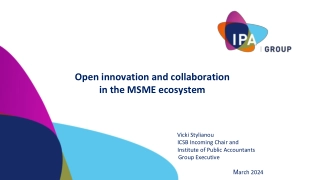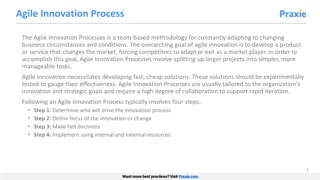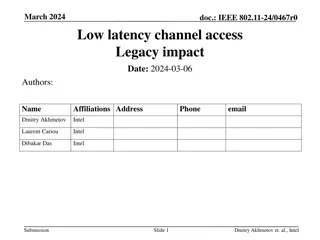The Impact of No Code-Low Code on Startup Innovation
In the vibrant world of startups, innovation is the cornerstone of success. As these businesses aim to carve out their niches, they often face a common hurdle: the extensive resources required for traditional software development. However, the emergence of low code no code (LCNC) platforms is revolutionizing how startups approach product development and operational efficiency. Especially in tech-forward cities like Ahmedabad, "low code no code app development Ahmedabad" has become a buzzword, resonating with the growing demand for faster, more agile development processes.
Download Presentation
Please find below an Image/Link to download the presentation.
The content on the website is provided AS IS for your information and personal use only. It may not be sold, licensed, or shared on other websites without obtaining consent from the author. Download presentation by click this link. If you encounter any issues during the download, it is possible that the publisher has removed the file from their server.
Presentation Transcript
The Impact of No Code-Low Code on Startup Innovation
In the vibrant world of startups, innovation is the cornerstone of success. As these businesses aim to carve out their niches, they often face a common hurdle: the extensive resources required for traditional software development. However, the emergence of low code no code (LCNC) platforms is revolutionizing how startups approach product development and operational efficiency. Especially in tech-forward cities like Ahmedabad, "low code no code app development Ahmedabad" has become a buzzword, resonating with the growing demand for faster, more agile development processes.
Enabling Rapid Prototyping and Market Testing A For startups, the ability to quickly bring an idea to market can significantly impact their survival and growth. Low code no code mobile app development empowers these companies to create prototypes and iterate on them without extensive coding knowledge. This democratization of app development accelerates the feedback loop, allowing startups to refine their offerings based on real user data before committing significant resources. In Ahmedabad, where the startup ecosystem is burgeoning, low code no code app development provides an invaluable tool for entrepreneurs who need to adapt quickly to changing market conditions.
Reducing Development Costs and Time One of the most significant advantages of low code no code mobile app development is the reduction in development time and costs. Traditional app development not only requires skilled programmers but also involves lengthy development cycles. LCNC platforms streamline this process by offering pre-built templates and drag-and-drop interfaces, which reduce the need for complex code writing. For startups in Ahmedabad, this means lower overhead costs and the ability to allocate more resources towards other critical areas like market research, customer acquisition, and product innovation.
Fostering Innovation Through Accessibility The accessibility of low code no code platforms has a profound impact on the inclusivity of the tech industry. By lowering the barrier to entry, LCNC platforms enable founders with non-technical backgrounds to bring their innovative ideas to life. This inclusivity fosters a more diverse range of solutions and services, enriching the startup ecosystem. In Ahmedabad, where diverse industries converge, low code no code app development services are pivotal in enabling non-tech entrepreneurs to contribute to the digital economy.
Enhancing Flexibility and Scalability As startups grow, their software needs can change dramatically. Low code no code mobile app development platforms offer scalability and flexibility that is often crucial for startups. These platforms allow for easy updates and modifications, which can be crucial when scaling up operations or pivoting the product strategy. For startups in Ahmedabad leveraging low code no code app development, this means they can remain agile, adapting their applications quickly in response to user feedback or shifts in business strategy.
Integrating Advanced Technologies Modern LCNC platforms are not just about simplifying app creation; they also integrate advanced technologies like artificial intelligence, machine learning, and blockchain. This integration allows startups to implement sophisticated features into their apps without needing specialized expertise. For example, a startup in Ahmedabad can use a low code no code platform to incorporate AI-driven chatbots or blockchain for secure transactions, greatly enhancing their app's capabilities and appeal without significant cost increases.
Challenges and Considerations Despite the advantages, low code no code development is not without challenges. Concerns about the uniqueness of the product, limitations in customization, and dependency on the platform provider are valid. Startups must carefully evaluate whether an LCNC solution can meet their specific needs and consider how it fits into their long-term technology strategy.
The Future of Low Code/No Code in Startups The impact of low code no code on startup innovation is expected to grow as these platforms become more sophisticated. In Ahmedabad and globally, as more startups recognize the benefits of LCNC, we are likely to see an increase in adoption. This trend will continue to drive the evolution of the startup landscape, making technology development more accessible and less resource-intensive.
In conclusion, low code no code mobile app development is dramatically transforming the startup ecosystem in Ahmedabad and beyond. By enabling faster deployments, reducing costs, and democratizing app development, LCNC platforms are not just supporting startup innovation they are actively driving it. Companies like Theta Technolabs are at the forefront of this movement, providing tailored solutions that harness the power of low code no code app development to propel startups toward rapid growth and innovation. As this trend continues, the role of traditional coding in initial stages of startup development may diminish, making room for more innovative and diverse business models that can swiftly adapt to the market's demands.
Thank You For More Details Click Here : https://thetatechnolabs.in/

















































